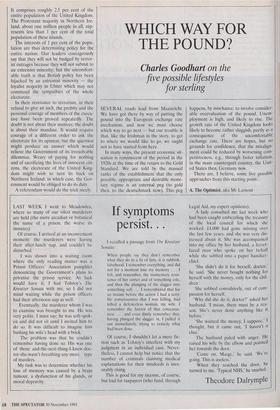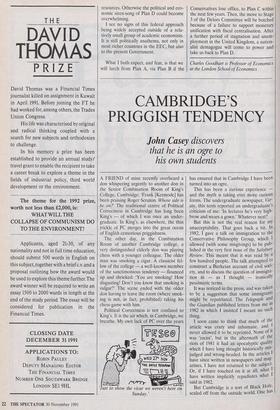WHICH WAY FOR THE POUND?
Charles Goodhart on the
five possible lifestyles for sterling
SEVERAL roads lead from Maastricht. We have got there by way of putting the pound into the European exchange rate mechanism, and now we must choose which way to go next — but our trouble is that, like the Irishman in the story, to get to where we would like to go, we ought not to have started from here.
In many ways, the present economic sit- uation is reminiscent of the period in the 1920s at the time of the return to the Gold Standard. We are told by the massed ranks of the establishment that the only possible, appropriate and desirable mone- tary regime is an external peg (to gold then, to the deutschmark now). This peg
happens, by mischance, to involve consider- able overvaluation of the pound. Unem- ployment is high, and likely to rise. The growth rate of the United Kingdom looks likely to become rather sluggish, partly as a consequence of the uncomfortable exchange rate. 'there are hopes, but no grounds for confidence, that the misalign- ment could be reduced by worsening com- petitiveness, e.g., through faster inflation, in the main counterpart country, the Unit- ed States then, Germany now.
There are, I believe, some five possible approaches from this starting point:-
A: The Optimist, aka Mr Lamont
The optimist believes that this analysis is Overstated and the degree of overvaluation of the pound exaggerated. Moreover, the firmness of resolve to maintain the ERM parity is already helping to bring about additional wage flexibility. Many firms are imposing wage standstills. As our inflation subsides, interest rates can be cut consis- tent with maintaining our ERM parity. The consumer will lead us out of the reces- sion. The same consumer may lead us back into a rising current account deficit, but that is a long-run problem (for a subse- quent Chancellor), which is containable at present. I wish that I, too, could be so opti- mistic. No doubt much the same was said in 1925.
B. The Fixer Although market forces, working through high unemployment, will take too long and be too painful to be acceptable, the con- juncture may be such as to persuade union leaders and employers to enter into an incomes policy. This would help wages to move towards internationally competitive levels.
This policy may well work in smaller, more cohesive societies, for, example in the Nordic countries. Experience in the Unit- ed Kingdom suggests that anyone believing it would work here is just as optimistic as those following Plan A.
C. The Devaluationist Having tried, and failed, with Plan A, and if the Conservatives are defeated at the next election, probably with Plan B as well, pressures (political and economic) could build up to such an extent that a realign- ment becomes imperative, possibly in 1993,
This, however; has a number of major disadvantages. It will cause disturbances in the ERM, upset our European colleagues and weaken our position to influence structural European developments still further. It will reduce the credibility of future government promises to stick to some anchor for achieving price stability. It will only be a temporary palliative.
, For all these valid reasons, course C will be both denied and deferred, but will Probably have to happen in the end.
D. The National Monetarist This group wants to avoid Plans A-C alto- gether by reverting to a domestic monetary rule, or more imaginatively, to a contract with the Bank of England, to leave the ERM, and refloat the pound.
This is perfectly consistent economically, but it means turning our back on Europe. Fro-Europeans cannot accept it.
E. The Federalist
A single European currency which will have winners and losers. Unless the losers are compensated — their votes, one way or another, bought — they will not stand for it. The poorer countries and regions will need large subsidies and transfers of
resources. Otherwise the political and eco- nomic siren-song of Plan D could become overwhelming.
I see no signs of this federal approach being widely accepted outside of a rela- tively small group of academic economists. It is still politically anathema, not only in most richer countries in the EEC, but also to the present Government.
What I both expect, and fear, is that we will lurch from Plan A, via Plan B if the Conservatives lose office, to Plan C within the next few years. Then, the move to Stage 3 of the Delors Committee will be botched because of a failure to support monetary unification with fiscal centralisation. After a further period of stagnation and unem- ployment in the United Kingdom, a nation- alist demagogue will come to power and take us back to Plan D.
Charles Goodhart is Professor of Economics at the London School of Economics












































































 Previous page
Previous page